Woman heads Labour Department
By Ananda KANNANGARA
|
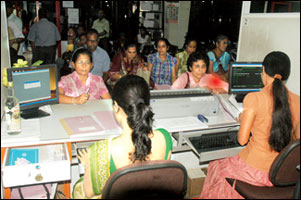
Employees discuss matters with officials at the Jaffna branch.
|
|
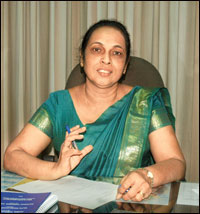
Labour Commissioner General Pearl Weerasinghe |
The Labour Department has a long history. The Department was
initially established during the colonial period in 1923 as the
Department of Indian Immigrant Labour to look into the welfare of Indian
immigration labour.
In 1931, the department was converted to a general department to look
into the well-being of all workers in the country and named the
Department of Labour. The department which comes under the Ministry of
Labour Relations and Manpower provides an invaluable service to the
eight million private sector workforce in the country. A number of
commissioners have served as Heads of the Department since its
inception. Prior to Pearl Weerasinghe was Labour Commissioner General
Mahinda Madihahewa and made an invaluable contribution during his long
service in the Department.
Pearl Weerasinghe who has over 25 years experience in the Labour
Department was appointed Labour Commissioner General last week. She is
the first woman to hold the post.
In an interview with the Sunday Observer, Commissioner General Pearl
Weerasinghe said thousands of private sector workers visit the
department from all parts of the country everyday for various purposes
and her only wish was to provide an efficient service to all of them.
She said that out of the large number of persons who visit the
Department, at least 75 percent come to attend to matters pertaining to
their Employees Provident Fund (EPF) benefits.
"Therefore, I would focus special attention towards the solving of
EPF related matters".
Following are the excerpts of the interview.
|
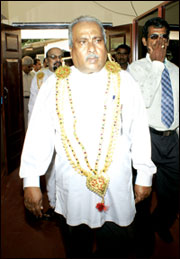
Minister Gamini Lokuge at the Labour Department branch opening
in Jaffna. |
Q: What is the strength of the private sector in the country?
A: There are about eight million
Q: In addition to the Narahenpita Head Office, how many Area Labour
officers are in the country?
A: We have established 56 area labour offices in all districts and
these offices are connected with the head office.
Q: Do people have to come to Colombo to get their work done?
A: Unlike earlier, now people need not come to Colombo for official
purposes. They could get their work done from their area offices.
Q: How long do you take to settle an EPF application?
A: If all relevant documents are submitted, the balances could be
made within three days.
Q: Are there EPF defaulters?
A: Yes, there are many errant employers who have not been registered
with the Labour Department. Most employers do not deduct provident fund
contributions from workers. Some employers deduct EPF from the salaries
of workers, but do not remit them to the Central Bank.
Q: What action do you take against such EPF defaulters?
|
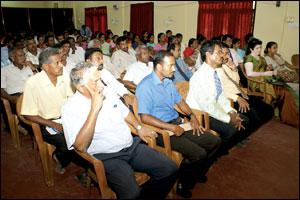
Employees wait for their turn at Jaffna office. |
A: We have deployed adequate investigating officers in every part of
the country to track down EPF defaulters. Even last year we tracked down
a number of employers who did not remit EPF deductions.
Q: How is the financial position of the EPF?
A: We have Rs. 850 billion under the EPF accounts in the Central
Bank. and a certain percentage of that amount has been invested to buy
treasury bills.
Q: What are the benefits the EPF members could obtain from their
balances?
A: We offer a 30 a percent housing loan and money for medical
expenses.
Q: Why does the Labour Department promote the private sector to
install finger print machines at their work places?
A: We have taken a decision to use the National Identity Card number
of each person as their EPF and ETF numbers in future.
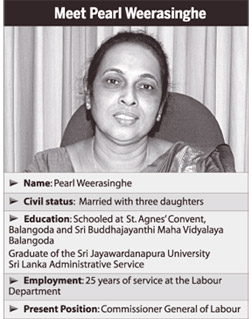 Therefore obtaining the finger prints of employees is needed to make
this program a success. In addition, the NIC number could also be used
instead of the bank account numbers currently used. Therefore obtaining the finger prints of employees is needed to make
this program a success. In addition, the NIC number could also be used
instead of the bank account numbers currently used.
Q: Will the private sector pension scheme be implemented?
|
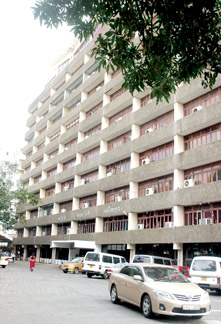
Head Office at Narahenpita.
Pic: Vipula Amarasinghe |
A: Yes, there are about eight million private sector workers in the
country and the Government needs to implement the pension scheme as soon
as possible. A National Labour Advisory Committee has been appointed to
discuss and submit proposals on this matter.
Q: Are there any regulations for employers in deploying female
workers on night shifts?
A: Yes, employers should seek the permission from the Labour
Department before females are deployed for night work.
Q: How will you facilitate a good relationship between employers and
employees?
A: I wish to conduct social dialogues and also workshops very often,
since such programs will be very useful to maintain a close rapport
between employers and employees. These programs will also help to stop
work stoppages and strikes.
Q: What steps would you take to give quick results to long-standing
labour cases?
A: For the benefit of workers we must take some measures in this
regard. |

